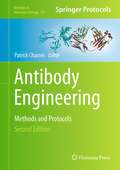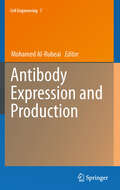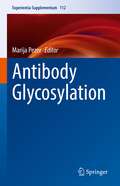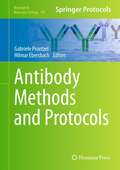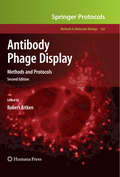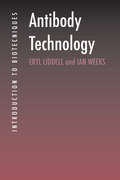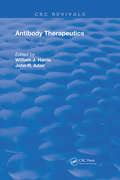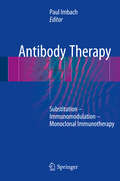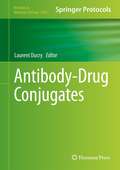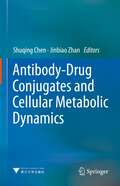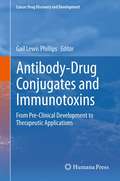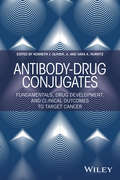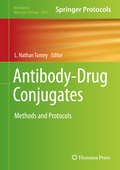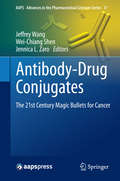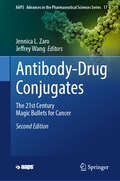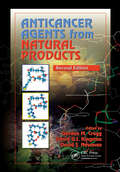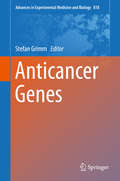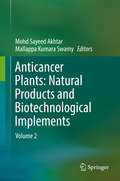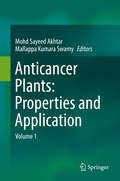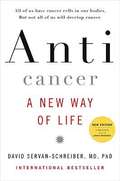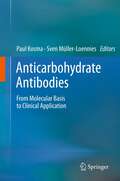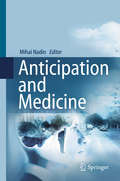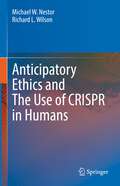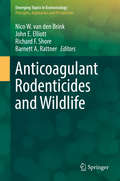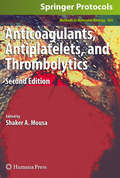- Table View
- List View
Antibody Engineering: Methods and Protocols, Second Edition (Methods in Molecular Biology #907)
by Patrick ChamesMore than ever, antibodies are being recognized as a major drug modality in a variety of diseases, including cancer, autoimmune diseases, infectious diseases, or even neurodegenerative disorders. Over 30 therapeutic antibodies have been approved and novel molecules are entering clinical trials at an average rate of 50 per year and that is predicted to continue well into the future. Notwithstanding the many achievements already made in the field, there is still a lot of room for improvements for these molecules in terms of activity, and a plethora of approaches have been attempted to optimize these molecules. Antibody Engineering: Methods and Protocols, Second Edition was compiled to give complete and easy access to a variety of antibody engineering techniques, starting from the creation of antibody repertoires and efficient ways to select binders from these repertoires, to their production in various hosts, their detailed characterization using various well established techniques, and to the modification and optimization of these lead molecules in terms of binding activity, specificity, size, shape, and more. Written in the successful Methods in Molecular BiologyTM series format, chapters include introductions to their respective topics, lists of the necessary materials and reagents, step-by-step, readily reproducible protocols, and notes on troubleshooting and avoiding known pitfalls. Authoritative and easily accessible, Antibody Engineering: Methods and Protocols, Second Edition serves as an invaluable resource for both experts and those new to the field, and most of all as a source of inspiration for the creation of the antibodies of tomorrow.
Antibody Expression and Production (Cell Engineering #7)
by Mohamed Al-RubeaiEngineered antibodies currently represent over 30% of biopharmaceuticals in clinical trials and their total worldwide sales continue to increase significantly. The importance of antibody applications is reflected in their increasing clinical and industrial applications as well as in the progression of established and emerging production strategies. This volume provides detailed coverage of the generation, optimization, characterization, production and applications of antibody. It provides the necessary theoretical background and description of methods for the expression of antibody in microbial and animal cell cultures and in transgenic animals and plants. There is a strong focus on those issues related to the production of intrabodies, bispecific antibody and antibody fragments and also to novel applications in cancer immunotherapy.
Antibody Glycosylation (Experientia Supplementum #112)
by Marija PezerThis book summarizes recent advances in antibody glycosylation research. Covering major topics relevant for immunoglobulin glycosylation - analytical methods, biosynthesis and regulation, modulation of effector functions - it provides new perspectives for research and development in the field of therapeutic antibodies, biomarkers, vaccinations, and immunotherapy.Glycans attached to both variable and constant regions of antibodies are known to affect the antibody conformation, stability, and effector functions. Although it focuses on immunoglobulin G (IgG), the most explored antibody in this context, and unravels the natural phenomena resulting from the mixture of IgG glycovariants present in the human body, the book also discusses other classes of human immunoglobulins, as well as immunoglobulins produced in other species and production systems. Further, it reviews the glycoanalytical methods applied to antibodies and addresses a range of less commonly explored topics, such as automatization and bioinformatics aspects of high-throughput antibody glycosylation analysis. Lastly, the book highlights application areas ranging from the ones already benefitting from antibody glycoengineering (such as monoclonal antibody production), to those still in the research stages (such as exploration of antibody glycosylation as a clinical or biological age biomarker), and the potential use of antibody glycosylation in the optimization of vaccine production and immunization protocols. Summarizing the current knowledge on the broad topic of antibody glycosylation and its therapeutic and biomarker potential, this book will appeal to a wide biomedical readership in academia and industry alike.Chapter 4 is available open access under a Creative Commons Attribution 4.0 International License via link.springer.com.
Antibody Methods and Protocols (Methods in Molecular Biology #901)
by Gabriele Proetzel Hilmar EbersbachThe rapidly growing field of antibody research is the result of many advancing technologies allowing current developments to take advantage of molecular engineering to create tailor-made antibodies. Antibody Methods and Protocols attempts to provide insight into the generation of antibodies using in vitro and in vivo approaches, as well as technical aspects for screening, analysis, and modification of antibodies and antibody fragments. The detailed volume is focused on basic protocols for isolating antibodies and, at the same time, it selects a range of specific areas with the aim of providing guides for the overall process of antibody isolation and characterization as well as protocols for enhancing classical antibodies and antibody fragments. Written in the highly successful Methods in Molecular BiologyTM series format, chapters include introductions to their respective topics, lists of the necessary materials and reagents, step-by-step, readily reproducible laboratory protocols, and tips on troubleshooting and avoiding known pitfalls. Authoritative and easy to use, Antibody Methods and Protocols provides a broad and useful background to support ongoing efforts by novices and experts alike and encourages the development of new imaginative approaches to this vital area of study.
Antibody Phage Display: Methods and Protocols (Methods in Molecular Biology #562)
by Robert AitkenSince its introduction almost 20 years ago, phage display technology has revolutionized approaches to the analysis of biomedical problems, quickly impacting the fields of immunology, cell biology, biotechnology, pharmacology, and drug discovery. In Antibody Phage Display: Methods and Protocols, Second Edition, expert researchers explore the latest in this cutting-edge technology, providing an invaluable resource that will guide readers in the design and execution of experiments based around antibody phage display. Chapters present a wide range of methods of isolating recombinant antibodies from phage display libraries, examine how the targets recognized by antibodies of interest can be identified, discuss the identification and exploitation of antibodies that can enter cells and bind to cytosolic targets, and include novel approaches to the expression of recombinant antibodies. Composed in the highly successful Methods in Molecular BiologyTM series format, each chapter contains a brief introduction, step-by-step methods, a list of necessary materials, and a Notes section which shares tips on troubleshooting and avoiding known pitfalls. Detailed and innovative, Antibody Phage Display: Methods and Protocols, Second Edition is a critical handbook on phage display technology which is certain to stimulate the reader's imagination as much as it will guide future practice in the laboratory.
Antibody Technology
by Eryl Liddell Ian WeeksThis book provides a comprehensive overview of antibody technology. It discusses in detail the new generation of engineered antibodies and the latest developments in immunoassay techniques and applications, as well as describing conventional methods of antibody production and use. Antibody Technology will bring the reader up-to-date with current methods, helping the reader to make informed decisions on the best approach to a given task with regard to cost, time and final application.
Antibody Therapeutics (Routledge Revivals)
Published in 1997: Antibody Therapeutics is a comprehensive evaluation of progress toward using humanized antibodies as a new generation of therapeutics. The humanized antibodies that have led the way in product approval are discussed as case studies, offering an insight into the preclinical and clinical data acquired during the regulatory approval process. Leading experts offer their findings as examples of what works and what does not, saving you time and making your research more cost effective. This book is essential reading for researchers, clinicians, development and regulatory staff in pharmaceutical and biotechnology companies, and hospital staff, including policy and decision makers. It also provides postgraduate and medical students with an authoritative overview of the field.
Antibody Therapy: From Igg Substitution To Immunomodulation And Monoclonal Antibody Treatment
by Paul ImbachThis practical manual, written by well-known experts, reviews current indications for the use of IgG concentrates and some other modern immunomodulators and provides fundamental information on present-day immunomodulation in patients (and mice)
Antibody-Drug Conjugates (Methods in Molecular Biology #1045)
by Laurent DucryAntibody-drug conjugates (ADCs) represent a promising therapeutic approach for cancer patients by combining the antigen-targeting specificity of monoclonal antibodies (mAbs) with the cytotoxic potency of chemotherapeutic drugs. In Antibody-Drug Conjugates, expert researchers provide detailed protocols for many of the key ADC techniques necessary for working in the field. These chapters and methodologies are aimed at the key tasks necessary to identify a suitable target, properly design the mAb, the linker and the payload, as well as to conjugate them in a reproducible and scalable fashion. Written in the highly successful Methods in Molecular BiologyTM format, these detailed chapters include the kind of practical implementation advice that guarantees quality results. Authoritative and timely, Antibody-Drug Conjugates aims to further drive ADC development and thus help toward improving cancer treatments of the future.
Antibody-Drug Conjugates and Cellular Metabolic Dynamics
by Shuqing Chen Jinbiao ZhanThis book summarizes the related research achievements in Antibody-drug conjugates (ADCs) and their cell metabolism kinetics. The book has three main parts. The first part describes the basic theory of ADCs, including the basic concept and structure of ADCs, and the relationship between the targets of ADCs and their specific functions. The second part mainly introduces the endocytosis and intracellular metabolism of ADCs, including the relationship between endocytosis and ADC activity, the endocytosis and intracellular transport of ADCs, the distribution and metabolism of ADC in vivo. Then it discusses the new formats and research technology of ADCs, including the application of miniaturized antibodies in ADC synthesis, novel carriers for ADC design, the technology and application of site-specific conjugation, and approaches for analyzing the drug: antibody ratio (DAR), the study of pharmacokinetics of ADCs. This book combines the basic theory with the research technology. It can be used as a reference book for students, teachers and researchers of biomedical field.
Antibody-Drug Conjugates and Immunotoxins: From Pre-Clinical Development to Therapeutic Applications (Cancer Drug Discovery and Development)
by Gail Lewis PhillipsThis volume gathers the leading research on antibody-drug conjugates and immunotoxins. Following a rigorous overview, the volume delves into focused sections on all aspects of ADCs and ITs from clinical development through to targeted therapeutic applications and the latest technologies.
Antibody-Drug Conjugates: Fundamentals, Drug Development, and Clinical Outcomes to Target Cancer
by Kenneth J. Olivier Jr. Sara A. HurvitzProviding practical and proven solutions for antibody-drug conjugate (ADC) drug discovery success in oncology, this book helps readers improve the drug safety and therapeutic efficacy of ADCs to kill targeted tumor cells. * Discusses the basics, drug delivery strategies, pharmacology and toxicology, and regulatory approval strategies* Covers the conduct and design of oncology clinical trials and the use of ADCs for tumor imaging* Includes case studies of ADCs in oncology drug development* Features contributions from highly-regarded experts on the frontlines of ADC research and development
Antibody-Drug Conjugates: Methods and Protocols (Methods in Molecular Biology #2078)
by L. Nathan TumeyThis volume looks at key methodologies that are commonly used across antibody drug conjugates (ADCs) programs. The chapters in this book cover topics such as conjugations to endogenous cysteine residues; click chemistry conjugations; antibody conjugations via glycosyl remodeling; analysis of ADCs by native mass spectrometry; characterization of ADCs by capillary electrophoresis; LC/MS methods for studying lysosomal ADC catabolism; and determination of ADC concentration by ligand-binding assays. Written in the highly successful Methods in Molecular Biology series format, chapters include introductions to their respective topics, lists of the necessary materials and reagents, step-by-step, readily reproducible laboratory protocols, and tips on troubleshooting and avoiding known pitfalls. Cutting-edge and practical, Antibody-Drug Conjugates: Methods and Protocols is a valuable resource that aims to lower the “activation barrier” when undertaking a new discipline, and provides a “toolbox” for the next generation of ADC scientists.
Antibody-Drug Conjugates: The 21st Century Magic Bullets for Cancer (AAPS Advances in the Pharmaceutical Sciences Series #17)
by Jeffrey Wang Wei-Chiang Shen Jennica L. ZaroThis authoritative volume provides a holistic picture of antibody-drug conjugates (ADCs). Fourteen comprehensive chapters are divided into six sections including an introduction to ADCs, the ADC construct, development issues, landscape, IP and pharmacoeconomics, case studies, and the future of the field. The book examines everything from the selection of the antibody, the drug, and the linker to a discussion of developmental issues such as formulations, bio-analysis, pharmacokinetic-pharmacodynamic relationships, and toxicological and regulatory challenges. It also explores pharmacoecomonics and intellectual properties, including recently issued patents and the cost analysis of drug therapy. Case studies are presented for the three ADCs that have received FDA approval: gemtuzumab ozogamicin (Mylotarg®), Brentuximab vedotin (Adcetris®), and ado-trastuzumab emtansine (Kadcyla®), as well as an ADC in late-stage clinical trials, glembatumumab vedotin (CDX-011). Finally, the volume presents a perspective by the editors on the future directions of ADC development and clinical applications. Antibody-Drug Conjugates is a practical and systematic resource for scientists, professors, and students interested in expanding their knowledge of cutting-edge research in this exciting field.
Antibody-Drug Conjugates: The 21st Century Magic Bullets for Cancer (AAPS Advances in the Pharmaceutical Sciences Series #17)
by Jeffrey Wang Jennica L. ZaroThe field of antibody-drug conjugates (ADCs) has undergone remarkable advancements in recent years, marked by significant progress in both drug approvals and ongoing clinical development. Since the approval of the first ADC in 2010 (gemtuzumab ozogamicin, Mylotarg®), the landscape has expanded dramatically. Today, there are 11 FDA-approved ADCs, targeting a variety of cancers across multiple indications. The approved ADCs include a range of payloads, linkers, and antibodies, each optimized for a variety of specific therapeutic targets. The increasing diversity of ADCs reflects the growing potential of these innovative treatments to address a wide array of malignancies, from hematologic cancers to solid tumors. This book aims to provide a comprehensive overview of the current state of the ADC field including the latest developments, challenges, and emerging trends, comprising expertise from a broad range of disciplines from basic research, industry, clinical practice and regulatory affairs. We explore not only the scientific and technical aspects of ADC design—such as payloads, linkers, and antibody selection—but also the developmental hurdles and regulatory complexities that influence the success of ADCs in clinical practice. Real-world examples of ADCs that have made it from the lab to the clinic offer invaluable insights into the trials and triumphs that shape this dynamic field. It is our hope that this book will serve as both a valuable resource for experts in the field and an accessible introduction for those new to the exciting world of ADCs.
Anticancer Agents from Natural Products
by David J. Newman Gordon M. Cragg David G.I. KingstonThe approach to drug discovery from natural sources has yielded many important new pharmaceuticals inaccessible by other routes. In many cases the isolated natural product may not be an effective drug for any of several reasons, but it nevertheless may become a drug through chemical modification or have a novel pharmacophore for future drug design.
Anticancer Genes (Advances in Experimental Medicine and Biology #818)
by Stefan GrimmThis book discusses the emergence of a new class of genes with a specific anticancer activity. These genes, recently defined as "Anticancer Genes", are reviewed in individual chapters on their mode of action, the specific cell death signals they induce, and the status of attempts to translate them into clinical application. Anticancer Genes provides an overview of this nascent field, its genesis, current state, and prospect. It discusses how Anticancer Genes might lead to the identification of a repertoire of signaling pathways directed against cellular alterations that are specific for tumor cells. With contributions from experts worldwide, Anticancer Genes is an essential guide to this dynamic topic for researchers and students in cancer research, molecular medicine, pharmacology and toxicology and genetics as well as clinicians and clinical researchers interested in the therapeutic potential of this exciting new field.
Anticancer Plants: Volume 2
by Mohd Sayeed Akhtar Mallappa Kumara SwamyThis volume provides summarized scientific evidence of the different classes of plant-derived phytocompounds, their sources, chemical structures, anticancer properties, mechanisms of action, methods of extraction, and their applications in cancer therapy. It also discusses endophyte-derived compounds as chemopreventives to treat various cancer types. In addition, it provides detailed information on the enhanced production of therapeutically valuable anticancer metabolites using biotechnological interventions such as plant cell and tissue culture approaches, including in vitro-, hairy root- and cell-suspension culture; and metabolic engineering of biosynthetic pathways. Anticancer Plants: Natural Products and Biotechnological Implements – Volume 2” explores the natural bioactive compounds isolated from plants as well as fungal endophytes, their chemistry, and preventive effects to reduce the risk of cancer. Moreover, it highlights the genomics/proteomics approaches and biotechnological implementations. Providing solutions to deal with the challenges involved in cancer therapy, the book benefits a wide range of readers including academics, students, and industrial experts working in the area of natural products, medicinal plant chemistry, pharmacology, and biotechnology.
Anticancer plants: Volume 1
by Mohd Sayeed Akhtar Mallappa Kumara SwamyCancer is one of the leading death cause of human population increasingly seen in recent times. Plants have been used for medicinal purposes since immemorial times. Though, several synthetic medicines are useful in treating cancer, they are inefficient and unsafe. However, plants have proved to be useful in cancer cure. Moreover, natural compounds from plants and their derivatives are safe and effective in treatment and management of several cancer types.The anticancer plants such as Catharanthus roseus, Podophyllum peltatum, Taxus brevifolia, Camptotheca acuminate, Andrographis paniculata, Crateva nurvala, Croton tonkinensis, Oplopanax horridus etc., are important source of chemotherapeutic compounds. These plants have proven their significance in the treatment of cancer and various other infectious diseases. Nowadays, several well-known anticancer compounds such as taxol, podophyllotoxins, camptothecin, vinblastine, vincristine, homoharringtonine etc. have been isolated and purified from these medicinal plants. Many of them are used effectively to combat cancer and other related diseases. The herbal medicine and their products are the most suitable and safe to be used as an alternative medicine. Based on their traditional uses and experimental evidences, the anticancer products or compounds are isolated or extracted from the medicinally important plants. Many of these anticancer plants have become endangered due to ruthless harvesting in nature. Hence, there is a need to conserve these species and to propagate them in large scale using plant tissue culture. Alternatively, plant cell tissue and organ culture biotechnology can be adopted to produce these anticancer compounds without cultivation. The proper knowledge and exploration of these isolated molecules or products could provide an alternative source to reduce cancer risk, anti-tumorigenic properties, and suppression of carcinogen activities.Anticancer plants: Volume 1, Properties and Application is a very timely effort in this direction. Discussing the various types of anticancer plants as a source of curative agent, their pharmacological and neutraceutical properties, cryo-preservations and recent trends to understand the basic cause and consequences involved in the diseases diagnosis. We acknowledge the publisher, Springer for their continuous inspiration and valuable suggestions to improvise the content of this book. We further extend our heartfelt gratitude to all our book contributors for their support, and assistance to complete this assignment. I am sure that these books will benefit the scientific communities including academics, pharmaceuticals, nutraceuticals and medical practitioners.
Anticancer: A New Way of Life
by David Servan-SchreiberThis book describes natural methods of health care that contribute to preventing the development of cancer or to bolstering its treatment. They are meant to serve as a complement to conventional approaches (such as surgery, radiotherapy, chemotherapy).
Anticarbohydrate Antibodies: From Molecular Basis to Clinical Application
by Paul Kosma Sven Müller-LoenniesMany pathogens and aberrant malignant cells express unique carbohydrates on their surface representing attractive targets for vaccine design. Considerable progress has recently been made in the identification of novel carbohydrate based vaccines and a large number has reached clinical phase studies. The success of several licensed carbohydrate based vaccines against bacterial pathogens such as Haemophilus influenzae type b, Neisseria meningitidis or Streptococcus pneumoniae demonstrates their great potential. However, the study of anti-carbohydrate antibodies is technically challenging and partly because of low affinities and promiscuous specificity they have not been medically exploited to full potential. The study of antibody specificities and identification of protective carbohydrate epitopes lies at the heart of successful vaccine design. In addition to therapy, antibodies in general serve as diagnostic tools in medical and scientific laboratories. In this setting high affinity and exquisite specificity are important factors for their successful use. "Anticarbohydrate Antibodies - from molecular basis to clinical application" compiles current knowledge on the immunological recognition of carbohydrates by the adaptive immune system from a molecular perspective providing fundamental insight needed for advancing clinically relevant diagnostics and therapeutic applications. Based on significant progress in the fields of glycoimmunology and structural biology in recent years, the book comprehensively reviews the state-of-the-art in defining the key elements of carbohydrate recognition by antibodies, the molecular mimicry of carbohydrate epitopes as well as the molecular features leading to specific and relaxed binding modes. Backed-up by a combination of modern technologies to elucidate structural details of carbohydrate-antibody interactions, biomedically important carbohydrate antigens from viral, bacterial, parasite, insect and tumor cells have been analyzed in in-depth reviews written by well-known experts in the field. Fundamental knowledge of these molecular mechanisms eventually provides a rational basis to improve efficacy of carbohydrate-based vaccines and to further refine diagnostic tools in detection of pathogens and malignant cells.
Anticipation and Medicine
by Mihai NadinIn this book, practicing physicians and experts in anticipation present arguments for a new understanding of medicine. Their contributions make it clear that medicine is the decisive test for anticipation. The reader is presented with a provocative hypothesis: If medicine will align itself with the anticipatory condition of life, it can prompt the most important revolution in our time. To this end, all stakeholders--medical practitioners, patients, scientists, and technology developers--will have to engage in the conversation. The book makes the case for the transition from expensive, and only marginally effective, reactive treatment through "spare parts" (joint replacements, organ transplants) and reliance on pharmaceuticals (antibiotics, opiates) to anticipation-informed healthcare. Readers will understand why the current premise of treating various behavioral conditions (attention deficit disorder, hyperactivity, schizophrenia) through drugs has to be re-evaluated from the perspective of anticipation. In the manner practiced today, medicine generates dependence and long-lasting damage to those it is paid to help. As we better understand the nature of the living, the proactive view of healthcare, within which the science and art of healing fuse, becomes a social and political mandate.
Anticipatory Ethics and The Use of CRISPR in Humans
by Michael W. Nestor Richard L. WilsonThe future of gene editing in humans will involve the use of CRISPR. How we think about the combination of the scientific, ethical, and moral aspects of this technology is paramount to the success or failure of CRISPR in humans. Unfortunately, the current scientific discussion around CRISPR in humans has left ethics trailing behind due to the rapid pace of innovation. New modes of ethics and stakeholder participation are needed to keep pace with rapid scientific advances and provide the necessary policy and ethical frameworks necessary to help CRISPR flourish as an important health care tool to treat human disease. This requires intense interdisciplinary collaboration and discussion between scientists and philosophers, policymakers and legal scholars, and the public.Dr. Michael W. Nestor (a neuroscientist who actively uses CRISPR in pre-clinical research) and Professor Richard Wilson (a philosopher who focuses on anticipatory ethics) set out to develop a new ethical approach considering the use of CRISPR in human targeted therapies. The field of anticipatory ethics is uniquely poised to tackle questions in fast-evolving technical areas where the pace of innovation outstrips traditional philosophical approaches. Furthermore, because of its “anticipatory” nature, this type of analysis provides the opportunity to look ahead and into the future concerning potential uses of CRISPR in humans, uses that are not currently possible. Nestor and Wilson collaborate both scientifically and philosophically in this book to forecast potential outcomes as the scientific and medical community goes beyond using CRISPR to correct genes that underlie diseases where a single gene is involved. Instead, Nestor and Wilson envision CRISPR in complex, multigenic disorders with a specific focus on the use of CRISPR to edit genes involved in mental traits like IQ or other cognitive characteristics. They argue that the use of CRISPR to modify genes that are potentially important for mental traits represents a particular category for special consideration from scientists, policymakers, the public, and other stakeholders. Nestor and Wilson explain why using CRISPR to alter mental states is very different from treating a disease like cancer by combining the latest scientific advancements with anticipatory ethics and philosophical phenomenology. Their analysis considers the role that mental states play in personhood and the lived experience-as genes that can change mental/cognitive attributes like IQ have wide-ranging effects on the lived experience in ways that are categorically different from other attributes. This book was written to set a non-exhaustive framework for shared understanding and discussion across disciplines and appeal to scientists and non-scientists alike. This appeal is made inclusively, inviting all stakeholders to engage in active dialogue about the appropriate context for using CRISPR and other gene-editing technologies in humans. It provides policy analysis and recommendations for assuring the most inclusive, equitable, and ethically sound use of CRISPR in humans, concerning its positive potential to treat mental conditions like depression, schizophrenia, Alzheimer’s disease, autism, and the potential to induce other cognitive enhancements.
Anticoagulant Rodenticides and Wildlife (Emerging Topics in Ecotoxicology #5)
by John E. Elliott Nico W. van den Brink Richard F. Shore Barnett A. RattnerCommensal rodents pose health risks and cause substantial damage to property and food supplies. Rats have also invaded islands and pose a serious threat to native wildlife, particularly raptors and seabirds. Estimates of total damage from introduced rats range into the billions of dollars in developed countries. This book aims to provide a state-of-the-art overview of the scientific advancements in the assessment of exposure, effects and risks that currently used rodenticides may pose to non-target organisms in the environment, along with practical guidance for characterization of hazards. This will be discussed in relation to their efficacy, and the societal needs for rodent control, and discussion of risk mitigation and development of alternatives. The flow in the book is planned as: a. introduction and setting the scene b. problem description (risks and effects on non-targets and secondary poisoning, development of resistance) c. ; alternatives, regulation and risk mitigation d. conclusions and recommendations
Anticoagulants, Antiplatelets, and Thrombolytics, 2nd Edition: Methods And Protocols (Methods in Molecular Biology #663)
by Shaker A. MousaDuring the past decade, remarkable progress has been made in the development of newer drugs to prevent and treat thromboembolic disorders, such as oral direct anti-Xa and anti-IIa antagonists, as well as oral antiplatelet ADP antagonists with rapid onset and offset. In addition, there has been concentrated effort aimed at identifying novel uses of traditional antithrombotic drugs, such as aspirin, heparin, and oral anticoagulants, as well as combinations of agents, such as more than one antiplatelet, antiplatelet with anticoagulant, antiplatelet with or without thrombolytic. Anticoagulants, Antiplatelets, and Thrombolytics, Second Edition provides updates on various strategies in thrombosis, experimental models, and clinical and recent advances in the discovery and development of novel antithrombotics. As a volume in the highly successful Methods in Molecular BiologyTM series, this collection provides the kind of detailed description and implementation advice that is crucial for getting optimal results. Easy to use and up to date, Anticoagulants, Antiplatelets, and Thrombolytics, Second Edition is an ideal guide for researchers aiming for the future of this vital field, focusing on the prevention of thromboembolic disorders and the protection of the vascular endothelium.
